Erasing LGBTI history
I was surprised to read the news that Daniel Andrews, premier of Victoria, was going to fund Australia’s first Pride Centre to the tune of $15 million. Mostly because I used to work in one in Sydney more than fifteen years ago.

I was surprised to read the news that Daniel Andrews, premier of Victoria, was going to fund Australia’s first Pride Centre to the tune of $15 million. Mostly because I used to work in one in Sydney more than fifteen years ago.

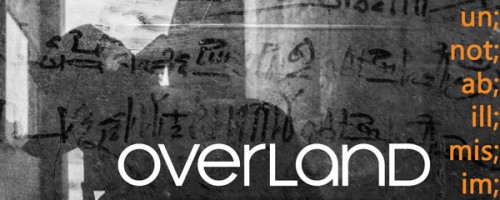
I’ve been so bored with realist Australian fiction; sleepy stories that perhaps have one eye open, but aren’t looking at anything worth seeing. I’m guilty of it too. You should see the piece I’m working on at the moment; it’s terrible, and leaves me wanting to turn the pages inside out. Still, I summoned the nerve to plead for something different.

The three judges for the 2015 competition – Charmaine Papertalk-Green, Overland’s Toby Fitch and Trinity College’s Katherine Firth – have now decided on a shortlist of six outstanding poems from up-and-coming Indigenous writers.

In reading through the hundreds of entries to the Neilma Sidney Prize, we were not only looking for quality writing but also for originality and an engaging narrative. Those stories that stood out to us often employed description in a way that appeared effortless, yet brought to life both the familiar and the unknown.

25 years ago, on 15 April 1991, the $40 million, three-year long Royal Commission into Aboriginal Deaths in Custody submitted its final report.
25 years on, the bulk of these recommendations continue to be ignored despite their relevancy being as acute today as they were a quarter of a century ago.
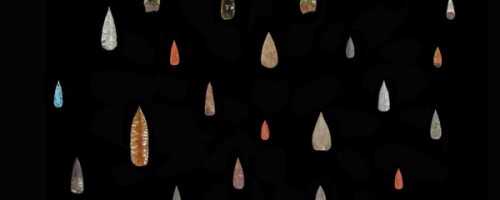
Encounters: Revealing Stories of Aboriginal and Torres Strait Islander Objects from the British Museum is nearing the end of its time at the National Museum in Canberra. I have no wish to dismiss the significance of this large-scale exhibition, the engagement with communities and the hard work of many Indigenous and non-Indigenous curators coming at these issues from the inside. But we should also be prepared to look critically at the consequences of acknowledging and listening, as if this were a political end unto itself.

When witches become palatable, they became controllable: I’d rather be a mad, dangerous, powerful crone than teen-screen friendly commercialised wank fodder, be it literally or – for the many feminist academics who went gaga for this mode of supposedly ‘progressive’ representation – something more symbolic.
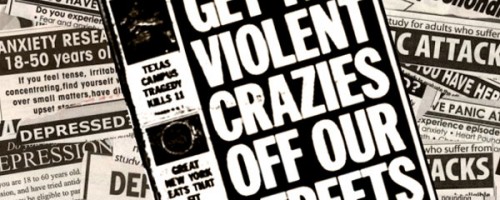
It is uncomfortable that in 2016 there is such easily accessible quality research available online which highlights the complex and intermittent nature of mental illness, yet the vernacular within the media remains regressive and stereotyped. Furthermore, not only is the reporting often negative, it can also be misrepresentative.

These days if you enter a McDonald’s restaurant in Australia or New Zealand and order a medium frozen Coke, they ask you if you wouldn’t rather have a large one, since they both cost $1 anyway. And why would you have the smaller one, when after all you can stop drinking it whenever you want? This basement price for the beverage – part of a promotion that began two years ago – could well be below cost, and seems designed to get you into the restaurant in the hope you will be persuaded to consume something else as well.

In a piece for Griffith Review’s recent edition on ‘Fixing the System’, Gabrielle Carey muses that Australia does not have a strong essayist tradition, and suggests that our ‘zealous commitment to egalitarianism’ might play a role, noting that ‘[i]f all people and opinions are equal, then there is no room for giving authority to a person or allowing them to lead the conversation’. This is an interesting theory, but I’m not sure about it.

Activists since the late 90s have shifted their focus. They now call for more acceptable demands; demands that attempt to assimilate queerness, rather than challenge heterosexual norms, for example advocating for queer people to serve in the military and, of course, gay marriage. The push to absorb gay lives into the neoliberal capitalist norms of monogamy, consumption and colonialism, is what we call ‘homonormativity’.

In the context of the census as a piece of national infrastructure, trying to raise a boycott doesn’t resemble a reasonable personal protest; it’s more of a distortion, and the ramifications can be severe. After all, to be not counted is to go underrepresented. That might be alright if you’re a North Shore libertarian, but selling a boycott to people who might have needs that require enumeration so services can be better provided tends towards the plain irresponsible.

A modern-day sugar tax is not about punishing a particular group and has a far more utilitarian basis. The concept of it is based on its function as a disincentive to change a set of unhealthy behaviours. Paternalism is often widely applauded – like compulsory minimum education, vaccination, drivers wearing seatbelts. Such laws are not immune to critique, nor should they be, but that’s ultimately how societies like ours can move along in roughly the right direction.

The book that got me thinking about the treatment of animals was Michel Faber’s Under the Skin. It covers many topics – what it means to be human, the role of women in society and so forth. But one of the strongest arguments in the book is that of vegetarianism. In it we see humans captured, castrated and gorged in order to feed an insatiable alien diet. It isn’t so much the ‘vegetarian’ alien character that convinces with his contrived speeches, but more the imagery of humans as cattle.

The police fan out, forming a gauntlet alongside the queue. The military precision of the manoeuvre belies their unease. Any Sydneysider who has been to a rally in recent years, or lives in a neighbourhood containing marginalised communities, such as Redfern where I do, will attest to how grim the force has become. But this lot crack awkward jokes. They glance around warily.
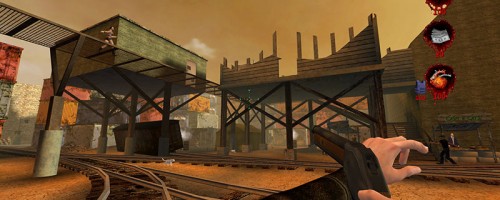
In my playthrough of controversial mobile phone game Survival Island 3, I didn’t meet a single Indigenous Australian.

Since at least the 1970s, writing on the experience of women in cities has focused on the ways in which the built environment acts as an expression of or enabler for the violence enacted upon women’s bodies: sexual assault and other violent crime, and the spatial separation of supposedly ‘masculine’ and ‘feminine’ space – that harmful dichotomy of public and private dividing the home from the street and workplace.

One might be under the impression that transgender people have never been so visible nor been so accepted, from the Time Magazine cover declaring the ‘trans tipping point’ to the coming out of reality TV star Caitlyn Jenner, to more meaningful progress in access to medical treatment and human rights across much of the world. But visibility has always been a double-edged sword for transgender people, and while there have always been transphobic responses to trans gains (Germaine Greer, for instance, has been predictably awful for forty years), it was inevitable at some point that a substantial political backlash would emerge.

New World Summit (NWS) is an artistic and political organisation founded by Dutch artist Jonas Staal in 2012. Resembling an alternative United Nations, the Summit was initially convened to invite groups blacklisted during the ‘War on Terror’ – and thus excluded from formal democratic processes – to a series of ‘propositions for alternative parliaments’.
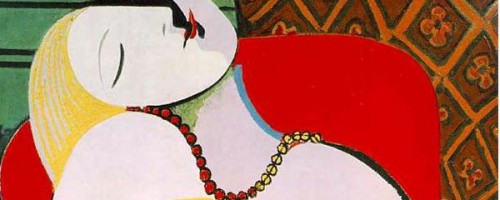
But surely the question of genius is not an economic concern? Or is it? We certainly live in a world where economics is central in all areas of life, including art.
Genius is a tantalisingly vague concept. And yet its historical association with dead white males such as Leonardo da Vinci and Albert Einstein, and in contemporary times, with Steve Jobs and the still very much alive Stephen Hawking, suggests its distinctly masculine character.

But really, isn’t nurturing the penniless avant-garde something we should all embrace? If we sincerely believe in the great life of the imagination, the radiant promise of its daily emergence in literature, music, art, and film, and in deep reflection and complex thought – all those inalienable horizons to being truly human – then we should also step-up and protect the imagination from the many equally great forces that humanity casts against it daily.

What does the exploitation of animals have to do with anything except the exploitation of animals? As Carol J Adams observes in The Sexual Politics of Meat, vegetarians appear to be saying one thing only: ‘Don’t eat meat’. But is it possible that there is more to be said?

‘I believe women’ has become something of a feminist catchcry. It has developed as a response to frequent and institutionalised trivialisation of sexual assault. The suggestion that women are making it up or just ‘looking for attention’, combined with the high acquittal rate of sexual assault cases, has brought about a kind of activism centred on an unshakeable faith in women’s accusations of sexual assault and on the public articulation of this position.
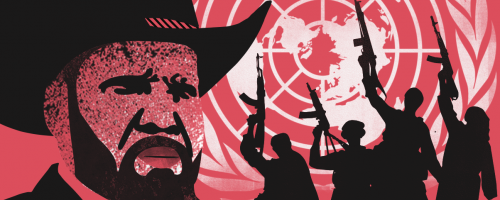
South Sudan is land-locked, sharing borders with Uganda, Central African Republic, Ethiopia, Kenya, Democratic Republic of Congo and Sudan. Like its neighbours, the country continues to endure the after effects of colonisation, having been occupied in the twentieth century by British interests. Much of the land is swamp or tropical forest, and the country hosts one of the largest wildlife migrations in the world.

Jamaica is a beautiful place, the book announced. It explained that it was almost always some mild kind of summer. Everything that grew there – mango, banana, sugarcane – was rich and sweet, and the fields were lush and green. The brown-black soil was almost like compost, not the kind of sandy dirt or terracotta clay you reached after half a foot or so of digging in our veggie garden at home.

I’ve long held a visceral hostility towards what I’ve called the ‘muesli theory’ of art. This theory maintains that art should be consumed because it’s good for you. Aside from anything else, the idea that art is good for you takes all the fun out of it. It gives art an air of lugubrious obligation that is completely at odds with the involuntary suspension of the self that is art’s most beautiful side effect.